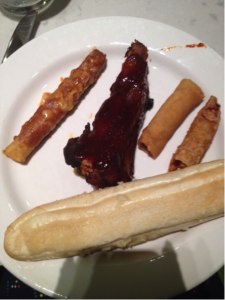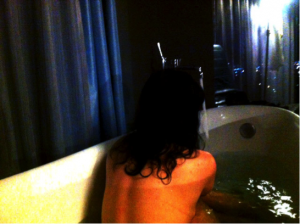Juliet Escoria & Scott McClanahan’s Honeymoon Tour Diary (Part 1)
SUNDAY, JULY 6
SAN DIEGO TO LAS VEGAS
SONG OF THE DAY: ELVIS PRESLEY “I CAN’T HELP FALLING IN LOVE”
JULIET: We packed up my stuff in the car, said goodbye to my family, and were on the road by 2pm. We stopped for food and gas in Elsinore. I decided that it would be a good idea to buy a pack of cigarettes (I quit smoking in November and haven’t had a cigarette since) and smoke one for every state we went through, in order to “celebrate our honeymoon.” As we drove, we listened to the mixes we made for our wedding. Most of the drive involved us discussing funny moments from the wedding. EXAMPLE: My dad apologized to Kendra Grant Malone for being so drunk. Kendra told him not to worry about it. My dad responded, “Power to the people.”
At some point, things took a turn for the worse. We passed the word “Calico” all big on the side of a mountain, which I’m not sure is a town or a street or a gang, but the conversation shifted to all the calico kitties pushing those rocks together with their paws. New characters were invented, such as Man Who Thinks It’s Still 1989 Politically and Woman Who Becomes Belligerent When She Sees Red Honda Accords.

Plate of stick-shaped items from buffet
We arrived in Vegas around 8pm. Our hotel room featured two bathrooms, a Jacuzzi bathtub, a shower with three showerheads, a fireplace, a dishwasher, etc. Everything was modern and sleek looking, to the point that the room felt vaguely terrifying and everything was difficult to use. I went on the computer to find a good buffet for Scott and me to eat at, because we had decided we wanted to eat until we felt sick. I found two ones that looked really good but that would have required us to walk so we ended up deciding to eat at the buffet at our hotel even though it had bad reviews on Yelp. The buffet was, as expected, mediocre. I ate one oyster anyway, even though I was afraid it would give me food poisoning (it didn’t). Scott drank five Diet Cokes.
We took a short walk afterward in order to feel slightly less fat, but didn’t get very far because it looked like it might start pouring rain (it didn’t). On the way back, we saw a very tall but handsome foreign guy walking arm-in-arm with two prostitutes. We discussed the nature of prostitution, and how it differed from stripping. It was concluded that prostitution was more honest and therefore in some ways more honorable. Scott seemed to know a lot about prostitutes, which troubled me.
At the hotel, I took a bath in the Jacuzzi bathtub. The tub was very large and oddly shaped and it made me feel like a lobster. I enjoyed the bath, and my lobsterness.

Juliet’s lobster bath
SCOTT: Yep.
‘I now pronounce you…’
Before the advent of modernism at the turn of the 20th Century, narratives usually ended with an engagement, a wedding, or a death. The protagonists of the relatively new novel form would find themselves paired off at the altar, or suffering their own demise. This narrative move demonstrates the power of marriage as a kind of full stop, a solution, a smoothing-over, the point that a relationship should be headed, even if it may fail on the way. It’s significant that although writers have since cast aside marriage as the standard form of plot resolution, marriage itself still remains a potent cultural force in the 21st century.
I want to make it clear that I’m talking about a Western cultural understanding of marriage, which over the course of the 20th and 21st centuries has become a predominantly secular affair, where subjects are able to freely choose their own spouses, and virginity and chastity are no longer prerequisites. This is based on current marriage trends, although there will always be specificities and areas of difference. It’s also important to recognise that the concept of marriage has an array of different meanings and traditions in other cultures, both secular and religious, which are far too vast for me to even attempt to discuss here.
December 7th, 2012 / 4:42 am

